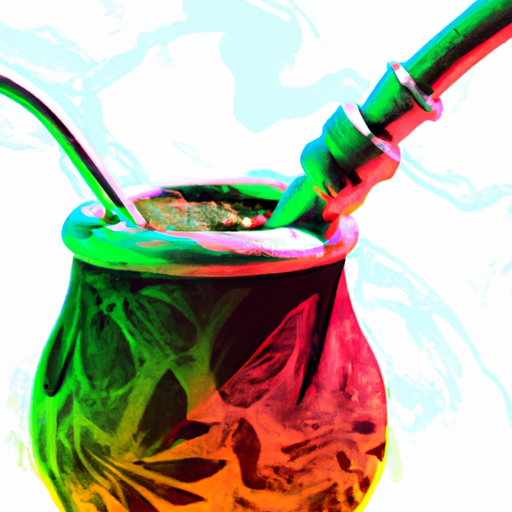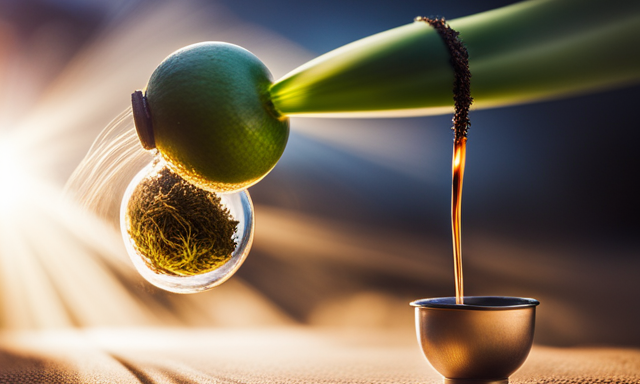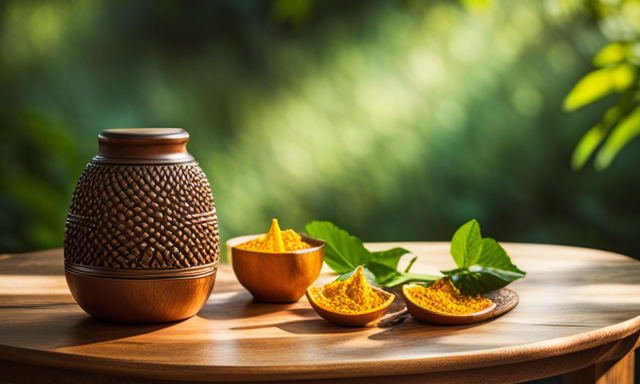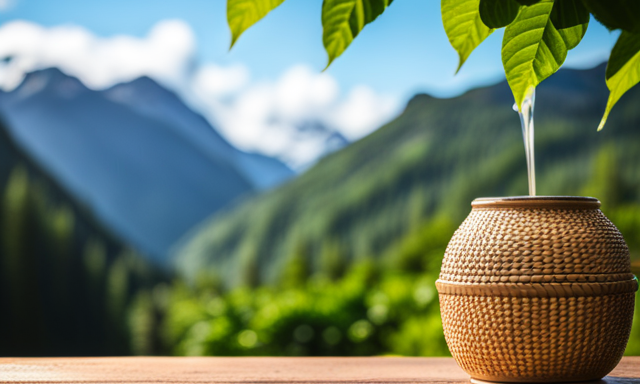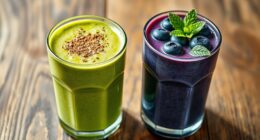I initially stumbled upon Yerba Mate while exploring South America. It seemed to be a favorite drink among the residents, who regularly enjoyed it from morning till night. Curious about its widespread appeal, I chose to sample it and was delightfully taken aback by its impact.
But what exactly is Yerba Mate and how does it make you feel?
Yerba Mate is a traditional drink made from the leaves of the Ilex paraguariensis plant, which is native to South America. It has been consumed for centuries as a social and medicinal beverage, with many claiming that it provides numerous health benefits such as increased energy, improved digestion, and enhanced mental clarity.
In this article, we will explore the chemical composition of Yerba Mate and its effects on various aspects of our health and well-being.
Key Takeaways
- Yerba Mate provides numerous health benefits, including increased energy, improved digestion, enhanced mental clarity, and weight loss benefits.
- Yerba Mate contains natural stimulants like caffeine, theobromine, and theophylline, which improve athletic performance, increase aerobic capacity, and delay muscle fatigue when consumed before exercise.
- Yerba Mate enhances cognitive function, memory recall, and reaction time, making it an excellent beverage for those who need to focus and concentrate.
- Yerba Mate has cardiovascular benefits, as it reduces bad cholesterol levels, improves blood pressure regulation, and contains high polyphenol content that acts as an antioxidant and anti-inflammatory agent.
What is Yerba Mate? A Brief Overview
Do you know what yerba mate is? It’s a South American drink made from the leaves of the yerba mate plant that’s packed with caffeine and other natural compounds.
Yerba mate has been consumed for centuries in countries such as Argentina, Uruguay, and Paraguay, where it is a cultural staple. The cultivation of yerba mate involves harvesting the leaves from mature trees and drying them using traditional methods to preserve their flavor.
Yerba mate can be prepared in various ways depending on the region and personal preferences. In some areas, it is brewed in a gourd (called a ‘mate’) using hot water and a bombilla (a metal straw with a filter at the end) for drinking. Other methods include brewing it in a French press or tea infuser.
Some people prefer to add sugar or milk to their yerba mate while others enjoy its natural taste. The preparation method used can affect the chemical composition of yerba mate, which contains caffeine as well as other stimulants such as theobromine and theophylline.
These compounds can provide an energy boost similar to coffee but without the jitters or crashes often associated with coffee consumption. With this understanding of what yerba mate is and how it’s prepared, let’s take a closer look at its chemical composition.
The Chemical Composition of Yerba Mate
As you sip on this South American beverage, the unique blend of xanthines and polyphenols in yerba mate slowly work their way through your system. Yerba mate is composed of a variety of chemicals that contribute to its taste and health benefits. The table below highlights some of the key chemicals found in yerba mate:
| Chemical | Function |
|---|---|
| Caffeine | Stimulant |
| Theobromine | Stimulant |
| Theophylline | Bronchodilator |
| Chlorogenic Acid | Antioxidant |
These chemicals work together to provide a variety of health benefits. For example, caffeine and theobromine are both stimulants that can increase energy levels and improve mental focus. Meanwhile, chlorogenic acid is an antioxidant that helps protect against cell damage.
Overall, the chemical composition of yerba mate makes it a unique and beneficial beverage to enjoy. In addition to stimulating effects, it also contains compounds that can boost immune function and reduce inflammation. As we delve into the next section about the effects of yerba mate on energy and alertness, we will see how these chemicals come together to create a powerful experience for those who drink it regularly.
The Effects of Yerba Mate on Energy and Alertness
Get ready to feel an energizing boost with yerba mate as we explore its effects on increasing energy levels and alertness. Yerba mate contains caffeine, theobromine, and theophylline, which are natural stimulants that can help improve athletic performance by reducing fatigue and enhancing endurance.
In fact, studies have shown that drinking yerba mate before exercise can increase aerobic capacity and delay muscle fatigue. Not only does yerba mate benefit physical performance, but it can also enhance cognitive function.
The caffeine in yerba mate stimulates the central nervous system, improving mental alertness and focus. Additionally, research has shown that consuming yerba mate can improve memory recall and reaction time. As you can see, there are many benefits to incorporating yerba mate into your daily routine.
Not only does it provide a natural source of energy for physical activity, but it also enhances cognitive function for mental tasks. In the next section, we’ll explore how yerba mate may also aid in weight loss efforts without requiring any drastic steps or changes to your lifestyle.
Yerba Mate and Weight Loss
Yerba mate has been found to aid in weight loss, with a study showing that participants who consumed yerba mate daily for 12 weeks lost an average of 5.6 pounds. But how exactly does it help with weight loss? Here are four ways:
-
Boosts Metabolism: Yerba mate contains compounds that stimulate the production of adrenaline and noradrenaline, hormones that increase metabolism and burn fat.
-
Reduces Appetite: Yerba mate has been shown to reduce hunger pangs and cravings, helping people consume fewer calories throughout the day.
-
Increases Energy: With its caffeine content and other natural stimulants, yerba mate can provide a boost in energy levels, making it easier to engage in physical activity.
-
Improves Digestion: By promoting healthy digestion and regularity, yerba mate can help prevent bloating and constipation, which can contribute to weight gain.
In addition to aiding with weight loss, yerba mate has also been shown to have positive effects on digestion. So if you’re looking for a natural way to improve your overall health and well-being, consider adding this South American beverage to your daily routine!
Yerba Mate and Digestion
Adding yerba mate to your daily routine can potentially improve digestion and promote regularity. Yerba mate contains compounds such as saponins, which act as natural surfactants that help break down fats and proteins in the digestive system, making them easier to absorb.
Additionally, yerba mate has been found to stimulate the production of bile and other digestive enzymes, which can aid in the breakdown of food. Gut health is an important aspect of overall health, as it affects our immune system and mood.
Digestive issues such as bloating, constipation, or diarrhea can be uncomfortable and impact our daily lives. Drinking yerba mate may help alleviate some of these symptoms by improving gut motility and reducing inflammation in the intestines. However, it’s important to note that individual results may vary depending on factors such as diet and lifestyle.
Improving digestion with yerba mate is just one way this South American beverage can benefit our health. The next section will focus on how drinking yerba mate can potentially improve cardiovascular health by lowering cholesterol levels and reducing blood pressure.
Yerba Mate and Cardiovascular Health
If you’re looking for a natural way to improve your cardiovascular health, incorporating yerba mate into your routine could be beneficial. Studies have shown that yerba mate can provide various cardiovascular benefits such as reducing bad cholesterol levels and improving blood pressure regulation. This is due to the high polyphenol content found in yerba mate, which acts as an antioxidant and anti-inflammatory agent.
One study conducted on rats showed that consuming yerba mate helped prevent heart damage caused by oxidative stress. Another study involving human subjects found that drinking yerba mate improved blood flow and reduced hypertension in individuals with mild hypertension. These findings suggest that regularly consuming yerba mate may help reduce the risk of developing cardiovascular diseases.
In addition to its potential cardiovascular benefits, yerba mate has also been shown to have immune-boosting properties. By incorporating this herbal tea into your daily routine, you may not only improve your heart health but also give your immune system a boost.
Yerba Mate and Immune System
Just like how a shield protects a knight in battle, incorporating yerba mate into your daily routine can help boost your immune system and protect you from harmful pathogens.
Yerba mate contains several compounds that have been linked to immune-boosting benefits. One of these is theobromine, which has been shown to stimulate the immune system and reduce inflammation in the body.
Additionally, yerba mate is rich in antioxidants that help fight off free radicals and prevent cell damage. These antioxidants include polyphenols and flavonoids, which have been found to enhance immunity by improving the function of white blood cells.
Studies have also shown that consuming yerba mate may increase levels of immunoglobulin A, an antibody that plays a crucial role in defending against infections.
Incorporating yerba mate into your daily routine can provide numerous health benefits for your immune system. Its antioxidant properties and ability to reduce inflammation make it an ideal beverage for those looking to strengthen their defenses against harmful pathogens.
In the next section, we’ll explore how yerba mate can also positively impact mental health.
Yerba Mate and Mental Health
When you’re feeling stressed or anxious, incorporating yerba mate into your daily routine can potentially provide a natural solution to help improve your mental well-being. Yerba mate contains caffeine, theobromine, and theophylline, which are all known for their positive effects on the brain. These compounds work together to enhance focus and mental clarity while also promoting a sense of calmness.
Additionally, yerba mate has been found to have mood-enhancing properties due to its ability to increase dopamine levels in the brain. Dopamine is a neurotransmitter responsible for feelings of pleasure and reward. By increasing dopamine levels, yerba mate can help alleviate symptoms of depression and anxiety.
Overall, incorporating yerba mate into your daily routine may provide numerous benefits for mental health including increased focus and mental clarity as well as mood enhancement. However, it’s important to note that excessive consumption of yerba mate may lead to potential side effects and risks such as insomnia, headaches, and increased heart rate. Therefore, it’s essential to consume yerba mate in moderation and consult with a healthcare professional before making any significant changes to your diet or lifestyle.
Potential Side Effects and Risks
As someone who regularly drinks yerba mate, it’s important to be aware of the potential side effects and risks associated with its consumption.
For example, those with caffeine sensitivity may experience jitters or anxiety after drinking yerba mate.
Additionally, it’s important to note that yerba mate can interfere with certain medications and should be avoided in these cases.
Finally, some research has suggested an increased risk of certain cancers with excessive yerba mate consumption, although more studies are needed to confirm this association.
Caffeine Sensitivity
If you’re sensitive to caffeine, yerba mate may not be the best choice for you. Even though yerba mate doesn’t contain as much caffeine as coffee, it still has a significant amount that can affect your body. Caffeine tolerance varies from person to person, and some people are more sensitive than others.
For those who are sensitive to caffeine, drinking yerba mate can lead to negative health implications such as increased anxiety, heart palpitations, and insomnia. It’s important to note that even if you don’t have a known caffeine sensitivity, consuming too much yerba mate can still have adverse effects on your health.
It’s recommended that adults consume no more than 400 milligrams of caffeine per day (equivalent to four cups of coffee). If you exceed this limit regularly by consuming large amounts of yerba mate or other caffeinated products, you may experience negative side effects such as headaches and digestive issues.
In the next section, we’ll discuss another potential risk associated with drinking yerba mate: interference with medications.
Interference with Medications
After learning about caffeine sensitivity when consuming yerba mate, I wanted to explore another potential side effect: interference with medications. As someone who takes medication regularly, this was a concern for me.
Studies have shown that yerba mate can interact with certain medications, including some antidepressants and blood thinners. This is because compounds in yerba mate can inhibit enzymes responsible for breaking down these medications in the liver.
It’s important to talk to your healthcare provider if you consume yerba mate regularly and are taking medication. They may need to adjust your dosage or monitor you more closely.
Moving on from this potential complication, let’s explore how drinking yerba mate could impact other aspects of one’s health. One area of concern is an increased risk of cancer associated with consuming hot beverages like tea or coffee.
Let’s delve into this topic further.
Increased Risk of Cancer
You may be concerned about the potential risk of cancer associated with drinking hot beverages like yerba mate, but it’s important to understand the factors that contribute to this increased risk before jumping to conclusions. While some studies have pointed towards a possible link between yerba mate consumption and certain types of cancer, such as esophageal and oral cancers, further research is needed to confirm these findings.
It’s also worth noting that not all forms of yerba mate carry the same level of cancer risk. For example, traditional preparation methods involve drinking hot water infused with dried leaves from the yerba mate plant, which can lead to higher levels of carcinogenic compounds in the beverage. However, many commercial brands now offer premade yerba mate products that are processed differently and contain lower levels of these harmful substances. Ultimately, more research is needed to fully understand the relationship between yerba mate consumption and cancer risk.
Frequently Asked Questions
How long does it take for Yerba Mate to kick in?
The duration of the effects of yerba mate can vary depending on several factors such as dosage and individual sensitivity. Generally, it takes about 10-15 minutes for the caffeine in yerba mate to kick in and provide an energy boost that can last up to 6 hours.
However, other compounds in yerba mate such as theobromine and theophylline also contribute to its stimulating effects and may prolong the duration of these effects. It’s important to note that consuming too much yerba mate can lead to negative side effects such as anxiety, insomnia, and gastrointestinal discomfort.
Therefore, it’s recommended to start with a low dosage (around 1-2 grams) and gradually increase it if necessary while monitoring any adverse reactions.
Can Yerba Mate be consumed during pregnancy or breastfeeding?
When it comes to pregnancy safety and breastfeeding benefits, it’s important to note that consuming yerba mate may not be the best choice. While yerba mate does contain beneficial nutrients and antioxidants, it also contains caffeine which can potentially harm a developing fetus or infant.
It’s recommended that pregnant women and those who are breastfeeding opt for alternatives such as herbal teas or decaffeinated beverages. These options provide similar benefits without the potential risks associated with caffeine consumption.
Ultimately, it’s always best to consult with a healthcare provider before making any dietary changes during pregnancy or while breastfeeding to ensure the health and safety of both mother and baby.
Does Yerba Mate contain caffeine?
Oh, yerba mate. The drink that’s been touted as a miracle elixir with numerous health benefits.
But, let’s cut to the chase – does it contain caffeine? Yes, yerba mate does contain caffeine, but the amount varies depending on how it’s prepared and consumed.
On average, an 8-ounce cup of yerba mate contains about 30-50 mg of caffeine, which is less than a typical cup of coffee but more than other teas like green tea.
However, what sets yerba mate apart from energy drinks is that it also contains other compounds like theobromine and theophylline that provide a more sustained and balanced energy boost without the crash commonly associated with energy drinks.
So if you’re looking for a healthier alternative to your morning cup of joe or an afternoon pick-me-up, give yerba mate a try. Just don’t expect to feel like you can run a marathon after drinking it – there’s no magic potion for that (yet).
What’s the difference between Yerba Mate and traditional tea or coffee?
When comparing yerba mate to traditional tea or coffee, one major difference is that yerba mate contains less caffeine and more natural compounds that provide a smoother energy boost without the jitters or crash commonly associated with coffee.
Additionally, unlike energy drinks, yerba mate does not contain artificial sweeteners or high levels of sugar. Yerba mate has been shown to have numerous benefits for mental health including reducing anxiety and depression symptoms and improving cognitive function.
These benefits are attributed to the unique combination of natural compounds found in yerba mate such as caffeine, theobromine, and polyphenols.
Overall, choosing yerba mate over traditional tea or coffee can provide a more balanced source of energy while also providing potential mental health benefits.
How can I prepare Yerba Mate at home?
Preparing yerba mate at home is simple and enjoyable. First, gather your materials: a gourd, bombilla (a special straw), yerba mate leaves, and hot water.
Fill the gourd about ¾ full with yerba mate leaves and shake it gently to create an even surface. Then insert the bombilla into the center of the gourd, filling it with hot water until it reaches just below the top of the leaves.
After allowing several minutes for the herbs to steep, you can begin sipping through the bombilla while continuing to add more hot water as needed. Yerba mate comes in many different flavors, so you can experiment with mixtures that offer unique tastes like citrus or mint.
Preparing yerba mate at home is a great way to experience this traditional South American drink in a personalized setting without having to worry about any additives or artificial sweeteners found in store-bought versions.
Conclusion
In conclusion, I’ve found that drinking yerba mate can have numerous positive effects on my physical and mental health. It increases energy and alertness, boosts the immune system, and improves cardiovascular health, making it a staple in my daily routine.
A study published in the Journal of Food Science found that yerba mate contains higher levels of antioxidants than green tea. This is significant because antioxidants prevent damage to cells and reduce the risk of chronic diseases like cancer and heart disease. Knowing I’m consuming a beverage with such powerful health benefits only adds to my enjoyment of drinking yerba mate.
Overall, I highly recommend giving yerba mate a try. It tastes delicious, and its numerous health benefits make it an excellent choice for improving overall well-being. As always, be sure to talk with your healthcare provider before adding any new food or supplement to your diet.

